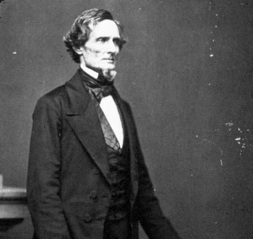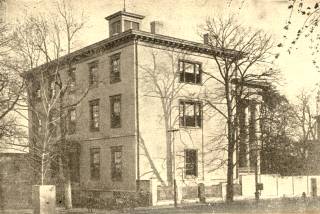Jefferson Davis was born in Kentucky and raised in Mississippi. He entered the U.S. Military Academy at West Point in 1824, graduating twenty-third in a class of thirty-four in 1828.
A slaveholder, Davis firmly believed in the desirability and importance of the institution of slavery for the South.
Davis served in both the U.S. House and the U.S. Senate, and in 1853, President Franklin Pierce appointed him U.S. Secretary of War. In 1857, Davis returned to the Senate as a vocal proponent of states rights. He formally withdrew from the U.S. Senate on January 21, 1861 after Mississippi seceded from the Union.
One month later, the Confederate Congress selected Davis to become the provisional President of the Confederacy. He was inaugurated for a six-year term as President on February 22 of the following year. Davis was a compromise candidate chosen to appease both the moderate and radical factions in the Confederate Congress.
Unfortunately for the South, Davis was an ineffective president and had a disagreeable personality. Moreover, the growing number of Confederate defeats also affected his popularity. On April 2, 1865, he and the other members of the Confederate government were forced to flee from Richmond before the advancing Union Army.
Union cavalrymen arrested Davis near Irwinville, Georgia, on May 10, 1865. He was taken into custody as a suspect in the assassination of Lincoln, but no link could ever be established. The U.S. Government then charged him with treason against the United States for organizing and arming the 1864 military invasions of Maryland and the District of Columbia during the American Civil War (1861–1865). Davis demanded a trial as the best forum for proving the constitutionality of secession, and the government requested numerous time extensions to prepare its case.
There were a number of other delays in advancing the case, including the bringing of impeachment charges against President Andrew Johnson. The U.S. Circuit Court for the District of Virginia finally heard preliminary motions for Davis’s trial in December 1868. The defense asked for a dismissal claiming that the Fourteenth Amendment to the U.S. Constitution already punished Davis by preventing him from holding public office in the future, and that further prosecution and punishment would violate the double jeopardy restriction of the Fifth Amendment. The Circuit Court was divided and certified the question to the United States Supreme Court. Fearing the Supreme Court would rule in favor of Davis, President Johnson released an amnesty proclamation on December 25, 1868, issuing a pardon to all persons who had participated in the rebellion.
Becoming a free man, Davis traveled with his family to Europe and then returned first to Tennessee and shortly after to Mississippi. Mississippi tried sending Davis back to the U.S. Senate, but he was not legally qualified to serve since he refused to request an official pardon from the United States for his role in the Civil War.
Jefferson Davis died on December 6, 1889. The year before his death he implored the men of Mississippi to “lay aside all rancor, all bitter sectional feeling, and to make your places in the ranks of those who will bring about a consummation devoutly to be wished—a reunited country.”
Filed under: History, legal | Tagged: Civil War, History, legal |







Leave a comment